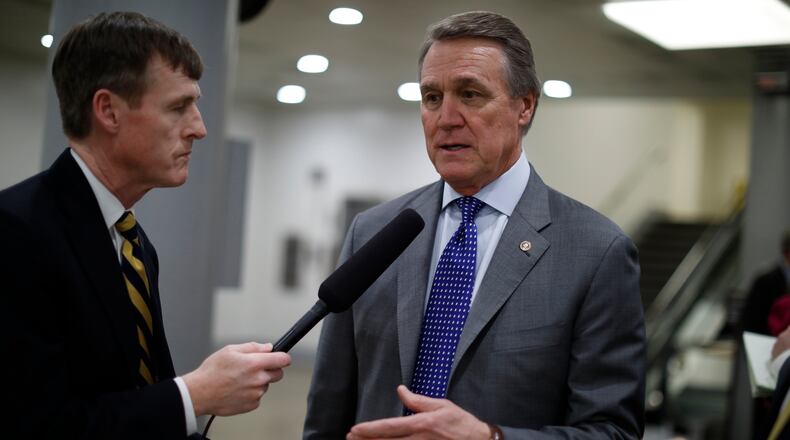It’s easy to forgive anyone whose eyes glaze over when the term “budget process reform” is uttered, but a pair of Georgia Republicans say they are genuinely excited for Congress’ latest effort.
U.S. Sen. David Perdue and U.S. Rep. Rob Woodall of Lawrenceville were both appointed to a special bipartisan committee created last month. The 16-member group is tasked with producing legislation by Nov. 30 that could help improve Capitol Hill’s oft-sputtering process for funding the government.
Outside expectations are low. There is nothing penalizing the group, which met for the first time on Thursday, if it fails to draw up recommendations. Previous attempts over the last decade to force Congress to change its practices have all fallen flat.
Perdue, a member of the Senate Budget Committee who has made overhauling the process a major focus in Washington, said he's "hopeful and optimistic and yet at the same time cynical."
“This isn’t the first select committee that’s been formed and the history of select committees is not very good, frankly. But yet we have a speaker of the House who adamantly wants to see the budget process reformed,” he told reporters this week.
Perdue is pushing for a new government funding process that wouldn’t favor one party over the other that includes real consequences if lawmakers don’t finish their work on time.
Congress has only been able to meet its appropriations deadlines four times out of the last four decades, according to the nonpartisan Congressional Research Service, and typically kicks off each budget year with a stopgap spending bill, forcing federal agencies to run on the previous year’s budget plans.
There is little clarity so far on what specifically the group will focus on, but Woodall said his main goal is that lawmakers on the panel “not let that opportunity slip.” Both parties have incentive to negotiate and make the process better because each side thinks it has a shot at winning control of the House in November, he said.
"Nobody, from the most liberal Democrat to the most conservative Republican, believes the process is serving either the Congress or the country well today," said Woodall, who recently ran unsuccessfully to lead the House Budget Committee.
Both Republicans and Democrats rail about how the annual government funding process, last overhauled in 1974, is dysfunctional and hyper-political.
The party in power, regardless of which it is, tends to pass a partisan budget blueprint at the beginning of the year and then spend months writing one-sided spending bills the minority would never support. The process eventually deadlocks and falls behind, and in recent years has resulted in a series of inefficient stopgaps or omnibus agreements, monster compromise spending bills negotiated in secret that few like, much less have time to read.
Another common criticism among conservative lawmakers in particular is that they aren’t allowed to touch about three-quarters of the $4 trillion-plus the government spends annually because it’s devoted to entitlement programs and is essentially off-limits.
Perdue argues this new overhaul effort could succeed where others failed because of the now $20 trillion-plus national debt. Soon the U.S. could face some serious consequences for its borrowing, he said, and Congress needs to step in and change course.
“Let’s not wait until the dollar as reserve currency is in debate or somebody doesn’t show up at a quarterly bond auction for the federal government and we’re in a crisis,” he said. “We’ve got an opportunity.”
The national debt has roughly doubled over the last decade as the government spent heavily on multiple wars abroad, an economic rescue package and, most recently, a $1 trillion-plus tax overhaul and two-year budget deal. Woodall and Perdue supported both pieces of legislation, as did many of their Georgia colleagues.
Georgia Republicans such as Perdue and Gainesville Congressman Doug Collins have pushed their party leaders to address Congress’ fiscal woes in recent months. (A working group Collins led last year recommended that Speaker Paul Ryan create a special budget commission.) But there may be little the two sides can agree on beyond modest changes to the budget process such as revisiting the start date of the fiscal year.
The parties are deeply suspicious of one another and agreeing to anything that could put them at a disadvantage down the road.
Election year politics also threaten to get in the way of the group’s work. Congress’ schedule is light this fall as lawmakers devote much of their time to campaigning for reelection.
Never miss a minute of what's happening in Georgia Politics. Subscribe to PoliticallyGeorgia.com.
About the Author
The Latest
Featured




